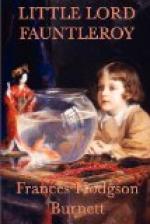“I’m afraid I don’t,” replied the Earl. “It’s an American game, isn’t it? Is it something like cricket?”
“I never saw cricket,” said Fauntleroy; “but Mr. Hobbs took me several times to see baseball. It’s a splendid game. You get so excited! Would you like me to go and get my game and show it to you? Perhaps it would amuse you and make you forget about your foot. Does your foot hurt you very much this morning?”
“More than I enjoy,” was the answer.
“Then perhaps you couldn’t forget it,” said the little fellow anxiously. “Perhaps it would bother you to be told about the game. Do you think it would amuse you, or do you think it would bother you?”
“Go and get it,” said the Earl.
It certainly was a novel entertainment this,—making a companion of a child who offered to teach him to play games,—but the very novelty of it amused him. There was a smile lurking about the Earl’s mouth when Cedric came back with the box containing the game, in his arms, and an expression of the most eager interest on his face.
“May I pull that little table over here to your chair?” he asked.
“Ring for Thomas,” said the Earl. “He will place it for you.”
“Oh, I can do it myself,” answered Fauntleroy. “It’s not very heavy.”
“Very well,” replied his grandfather. The lurking smile deepened on the old man’s face as he watched the little fellow’s preparations; there was such an absorbed interest in them. The small table was dragged forward and placed by his chair, and the game taken from its box and arranged upon it.
“It’s very interesting when you once begin,” said Fauntleroy. “You see, the black pegs can be your side and the white ones mine. They’re men, you know, and once round the field is a home run and counts one—and these are the outs—and here is the first base and that’s the second and that’s the third and that’s the home base.”
He entered into the details of explanation with the greatest animation. He showed all the attitudes of pitcher and catcher and batter in the real game, and gave a dramatic description of a wonderful “hot ball” he had seen caught on the glorious occasion on which he had witnessed a match in company with Mr. Hobbs. His vigorous, graceful little body, his eager gestures, his simple enjoyment of it all, were pleasant to behold.
When at last the explanations and illustrations were at an end and the game began in good earnest, the Earl still found himself entertained. His young companion was wholly absorbed; he played with all his childish heart; his gay little laughs when he made a good throw, his enthusiasm over a “home run,” his impartial delight over his own good luck and his opponent’s, would have given a flavor to any game.
If, a week before, any one had told the Earl of Dorincourt that on that particular morning he would be forgetting his gout and his bad temper in a child’s game, played with black and white wooden pegs, on a gayly painted board, with a curly-headed small boy for a companion, he would without doubt have made himself very unpleasant; and yet he certainly had forgotten himself when the door opened and Thomas announced a visitor.




